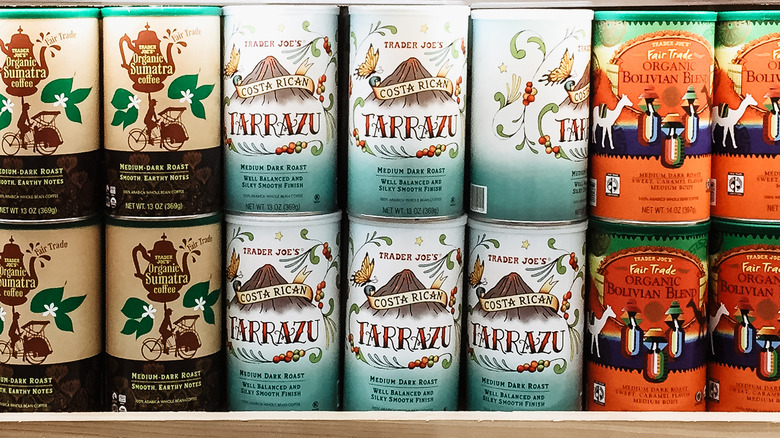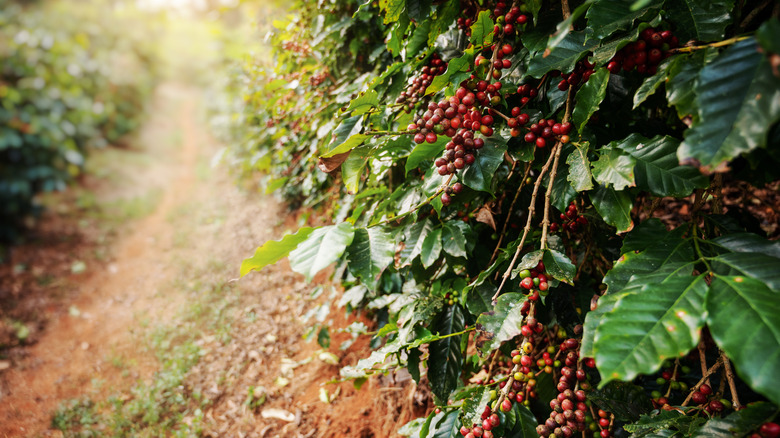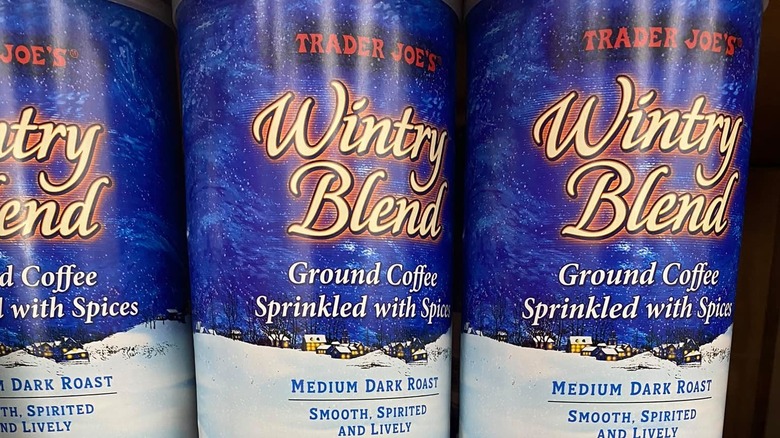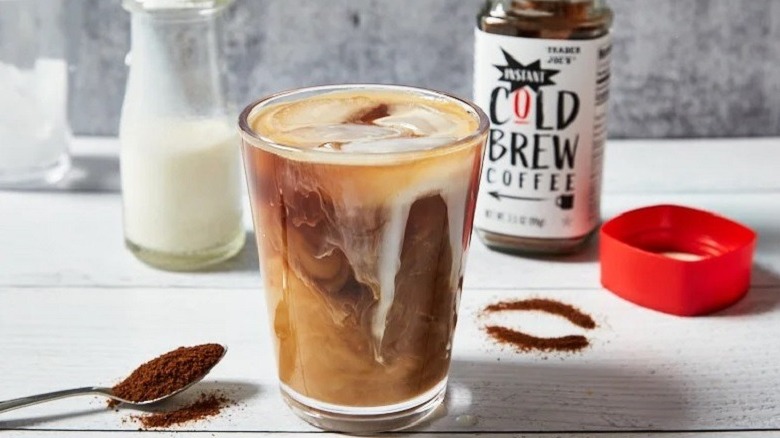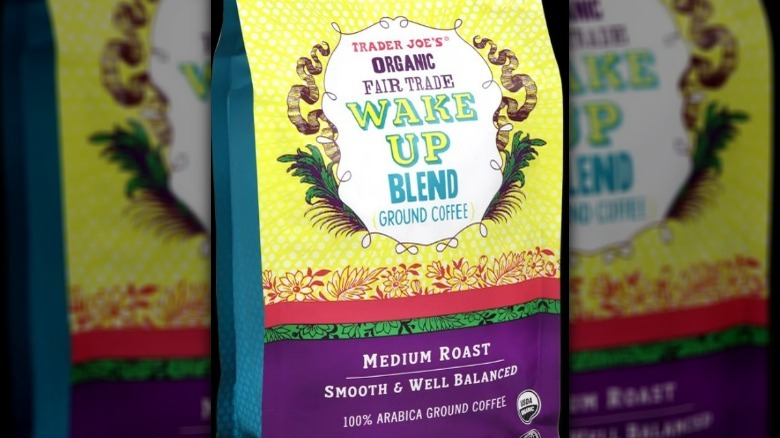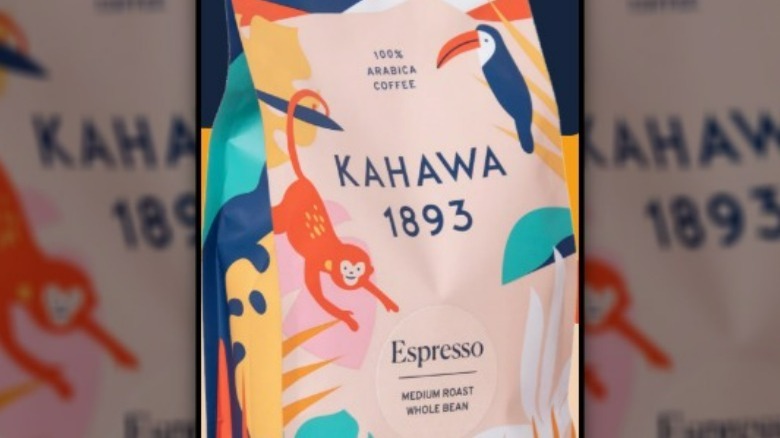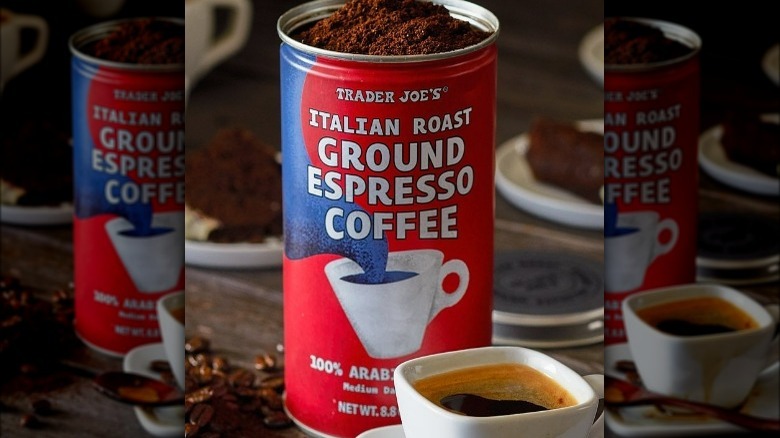The Untold Truth Of Trader Joe's Coffee
Saunter down to the coffee section of your local Trader Joe's and you'll likely come across multiple columns filled with a variety of different coffees. You won't find Starbucks or Pete's Tea & Coffee here. While the chain does carry different brands, Kiplinger reports that eight out of 10 items carry the Trader Joe's label. Being that this is a company who values inclusivity and diversity, it shouldn't surprise you that their coffee selection reflects that (via Trader Joe's). They make sure that there's something for everyone, whether you enjoy French roast, Breakfast Blend, or espresso, coffee cans or bags, as well as options for whole bean, ground, or even pods.
But beyond the basics, there's a lot more to learn about TJ's java selection. From seasonal spiced grounds to a cult sensation cold brew instant coffee, their wide selection of fair trade beans from their "Small Lot Production" line to the promoting of Black-owned roasteries, we're spilling the beans on Trader Joe's coffee.
Trader Joe's will buy up a farm's entire yearly production
The Bean Belt — the zone along the Equator that has ideal conditions for coffee plants to grow (via National Coffee Association) — is where Trader Joe's sources all of their delicious coffees. In response to customer requests — for example, more dark roasts or more medium-light roasts — the company relies heavily on their partner vendors and coffee scouts to search out small coffee farms that are located in the more remote areas of the Bean Belt. Their scouts will bring back samples to see if they're a good fit for customers, and if Trader Joe's get the green light, then the company will buy up the farm's entire production for that year (via episode 24 of the Trader Joe's Podcast — "The Coffee Cuppers' Guide to Trader Joe's").
There is one relatively major issue, though. Because these are small coffee farms, that means they yield a much smaller crop compared to a larger commercial-sized farm. A small lot, according to Lauren Wallace, the category manager in the corporate office in Boston, is approximately 40,000 to 80,000 pounds of coffee beans (via Trader Joe's Podcast). This ultimately means that if the coffee is a hit and ends up being sold out, customers will have to wait a full year for the coffee crop to regrow. As of 2020, Trader Joe's had contracts with eight small production farms — what they call the "Small Lot Program" — with plans to expand the program.
Flavored coffee isn't their specialty
While they have the standard French vanilla, flavored coffees aren't something that Trader Joe's really invests in. While some people swear by flavored coffee, it's not necessarily a hit with everyone. We find that it's easier to just grab your coffee and liven it up with some flavored syrup. Then you can add variety to your mornings by changing it up every so often. While Trader Joe's is famous for introducing out-of-the-box flavor options for several of their other offerings, when it comes to coffee, the focus is primarily on the quality of the beans rather than extra ingredients to add to them.
But if plain coffee just isn't your thing, TJ's does over limited seasonal flavors — Gingerbread, Pumpkin Spice, and Wintry Blend — as ground options. Trader Joe's refers to them as "spiced" or "seasoned" coffee, because instead of mixing in the questionable liquid chemical flavoring additive after the roasting process, their beans are blended together with spices like ginger, nutmeg, clove, cardamom, cinnamon, and even peppercorn. On the coffee episode of the Trader Joe's Podcast, it's mentioned that this is a cleaner method to adding subtle flavor, rather than an overly intense artificial flavor assault on your palate. These spiced coffees seem to be a hit with flavor lovers and non-flavor lovers. Their Wintry Blend, which is combined with cinnamon, clove, and green and red peppercorns, is a particular standout.
Trader Joe's instant cold brew coffee is a pretty big deal
Besides carrying canned and bottle cold brew, and concentrated cold brew, Trader Joe's released their somewhat controversial Instant Cold Brew Coffee in 2020. When you think of Instant coffee, the image that might come to mind is frantically searching your cupboards for coffee after realizing you're out, and finding an unopened — and possibly expired — jar of questionable brown crumbles hidden in the pantry behind your canned soup. On the other hand, cold brew — not to be confused with iced coffee — leaves you feeling refreshed and caffeinated, and isn't an instant beverage. In fact, when done properly, true cold brew can take up to 24 hours to make.
Marrying these two could have spelled disaster, but somehow, Trader Joe's managed to make it work. In less than a minute, you can stir up a glass and enjoy it as you like – the bottle even has little check boxes and instructions on how to prepare your brain juice. According to episode 24 of the Trader Joe's Podcast, their vendor brews batches of cold brew as it's normally, well, brewed. Then it's freeze-dried — like astronaut ice cream — and that's how it's created. Kitchn reports that it took Trader Joe's over two years to develop this recipe, and while the thought of instant cold brewed coffee may not make you jump up and down with excitement, maybe it's time to just give it a chance.
Many of their coffees are Fair Trade Certified
Just like the resurgence of the word "organic" (via Food Navigator), the phrase "Fair Trade Certified" has been garnering more attention in the world of coffee (and food and textiles). But what makes a Fair-Trade Certified coffee? According to Grounds for Change, fair trade coffee not only lets you know about the origin of the bean, but also gives farmers fair prices for their product. When farmers are paid what they actually should be, they're able to invest in their family's health and wellbeing and learn more about trade and sustainable practices that will ultimately protect the environment and benefit the farmer.
According to Thrillist, Trader Joe's carries at least 30 different types of coffee, the majority of which are organic and Fair Trade Certified. What's interesting is that even though Fair Trade Certified coffees tend to be pricier — because, as mentioned above, you're paying the farmers what they should be getting paid — Trader Joe's has managed to keep their prices on the lower tier. This means you can enjoy your fair trade coffee knowing that you not only got it at a great price, but you're also supporting the grower and their family. That's a win-win situation.
Trader Joe's is committed to supplier diversity
Trader Joe's is all about continuously improving diversity and inclusion throughout every aspect of their business, from employees to customers, and also vendors (via Trader Joe's). You can most definitely see this in their coffee offerings. As we mentioned earlier, though the majority of Trader Joe's coffees feature the TJ's label, they also carry different rotating specialty brands that vary from store to store. One example is Campfire Coffee Co., from Tacoma, Washington. The brand has made a big impact among those who have tried their product. Their methodology for roasting is over an open flame — the way it used to be — which isn't too common in the modern coffee industry. Even though it sounds simple, manual roasting takes constant attention and a high level of skill, but it also means that the roast master produces high-quality batches of super tasty beans (via The Atlantic).
Another brand you may find at Trader Joe's is Kahawa 1893. The company is owned and operated by Margaret Nyamumbo, a third-generation Kenyan coffee farmer and former Wall Street Investor and Harvard Graduate, whose mission is to address gender inequality in the coffee industry (via Kahawa 1893). According to Diaspora Messenger, Kahawa 1893 is sold at over 200 Trader Joe's locations and is the first Black woman-owned coffee brand available at Trader Joe's.
They were one of the first companies to put whole bean coffee in cans
Since the 1980s, Trader Joe's has used an aluminum-fiber based can for both ground and whole bean coffees (via Kitchn). Coffee actually begins to degrade once it's hit with light or oxygen, and tin cans are great for keeping those out. So why not use tins instead of these special receptacles? After coffee is roasted, it goes through a process called degassing (via Perfect Daily Grind). If the beans are packaged in an airtight container too soon after roasting, it can swell and burst. This can was created as a response to this exact situation. According to Trader Joe's Vice President of Marketing Matt Sloan, "Every so often, they would get packed a little too soon after roasting ... and sometimes they would explode" (via Trader Joe's Podcast)
All packaged foods undergo a process called nitrogen-flushing, which uses food-grade nitrogen to remove oxygen and keeps your food fresh (via Union Kitchen). That little valve on the coffee bag allows the release of carbon dioxide but keeps oxygen from entering. You want a bit of carbon dioxide to stay in the bag because that's what makes the coffee flavorful. By squeezing a bag of beans, you're removing the carbon dioxide (aka, aroma) and displacing the nitrogen (aka, freshness), which means you've sped up the deterioration of your coffee. These special cans not only keep the coffee fresh, they protect it from curious noses. So let's just stop squeezing the bags, okay?
